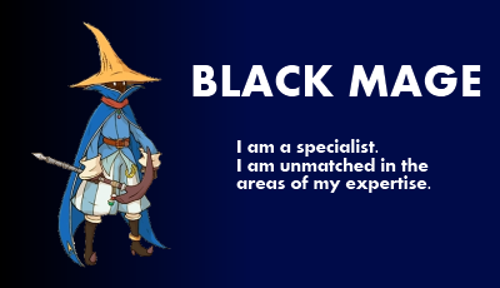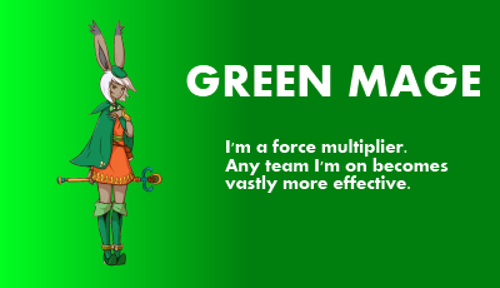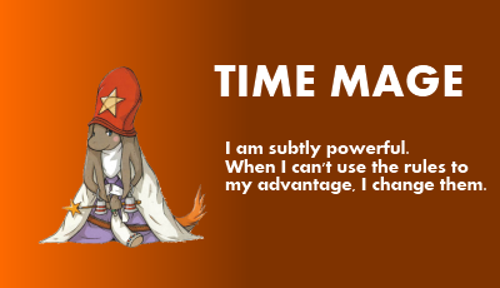So, a failure mode with buffs is when they present obligatory inscrutable math problems. Buffs aren’t the only thing that does that - this is an example of a more general failure mode in games. Jay Wilson, game director for Diablo III, calls it the “spreadsheet moment”:
There is a point I call the ‘spreadsheet moment’ where the variables have become so complicated that the average player can’t make a decision about their character or an item in their head. They require a spreadsheet, not for perfect optimization, but just to get an idea of what they’re doing. I’ve been known to map out abilities for a game I love in a spreadsheet for optimization. As a designer I want that level of depth in a game I make, but there is a point where you dump so much math on a player that they’re no longer capable of just making a decision and running with it because it’s what they like. When that point occurs we all portal back to town and alt-tab to the internet so someone who is better at math can make the decision for us.
Gamers are smart. They can feel when the math has gotten so complex they can’t process it in their heads, and the reaction is to assume that there ‘must’ be a clear correct singular decision. We desire that correct decision because humans like to apply order to things that seem chaotic. When we’re that sure of a singular right way to do something, no one wants to be the dummy who did it the “wrong” way. Unfortunately when players enter this mindset they’re no longer making the choice they want to make, for the sake of fun, but rather the choice they feel they have to make for the sake of being right.
I would argue there’s more going on here than just the complexity of the math - as I mentioned, Valkyria Chronicles grades and rewards you based on your efficiency, making it increasingly painful to make “wrong” decisions in combat - you’ll have fewer resources for the next mission making it even more important to avoid “wrong” decisions in a self-reinforcing cycle. But in a game like Borderlands an enemy drops the same loot whether you kill it in five seconds or six, so it’s less important to pick the absolute best gun. So even though the math on which guns are better is arguably more complex than the math on whether you should buff your soldiers, I’m much more comfortable eyeballing the guns and proceeding based mainly on feel.
And the clarity of the math matters a lot too. Explicit numbers with obvious meanings can still interact to create the “spreadsheet moment,” but if the numbers or their meaning is obscured, things get worse. As Shamus Young put it:
A good system is clear and understandable right away, but will reveal interesting trade-offs once you get to know it. (Diablo 2)
A boring system is straightforward and there is always a single, optimal answer. (Most BioWare games, at least until they abandoned gear-hoarding altogether.)
A bad system is one where you have no idea what decision you’re making and you have to do a bunch of homework and run a spreadsheet before you can know which hat you should wear.
A horrible system is one where you have to read the wiki just to know what options you should be researching. A system where you have over twenty attributes and most of them are synonyms. A system where you can read the wiki, a forum thread, and a leveling guide, and still not really have any idea what you’re doing because nobody agrees on how the stats work, which ones might be bugged, or if all of their calculations were made obsolete by the latest patch.
It’s easy to miss this amongst the other complaints, but there’s another key factor here as well - “interesting trade-offs” are part of a “good system” in Shamus’s nomenclature. He said this as part of a discussion of stats in World of Warcraft, where he argued that complex stats were particularly obnoxious because they generally boiled down to a simple trade-off of “efficiency versus survivability”. In his view (which I agree with), “you should never have more complexity than depth” and should present “decisions [which] are easy to understand but difficult to make” instead of ones where you have to do a bunch of research or math to find the unambiguous but uninteresting correct answer.
Extra Credits refers to the difference in these kinds of decisions as “calculations” (which are fundamentally math problems to optimize specific variables like DPS with options that can be cleanly quantified and ranked) and “incomparables” (which are more qualitative trade-offs like between a stealth or or combat build with no objective best option). With incomparables, players must make an actual choice based on personal preference and play-style - but we run into problems when games “mask calculations as incomparables”. Trying to make a calculation more interesting by making it more complex doesn’t stop there from being an objectively correct option - it just makes it harder to tell which one it is.








